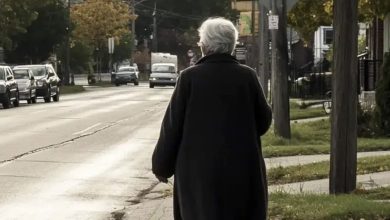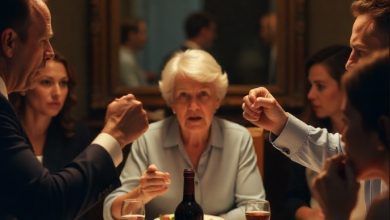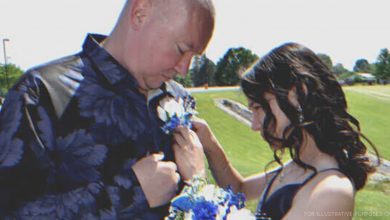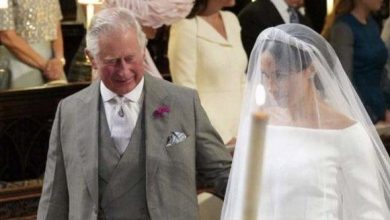From Mashed Potatoes to Broken Trust A Mother Fights to Save Her Family
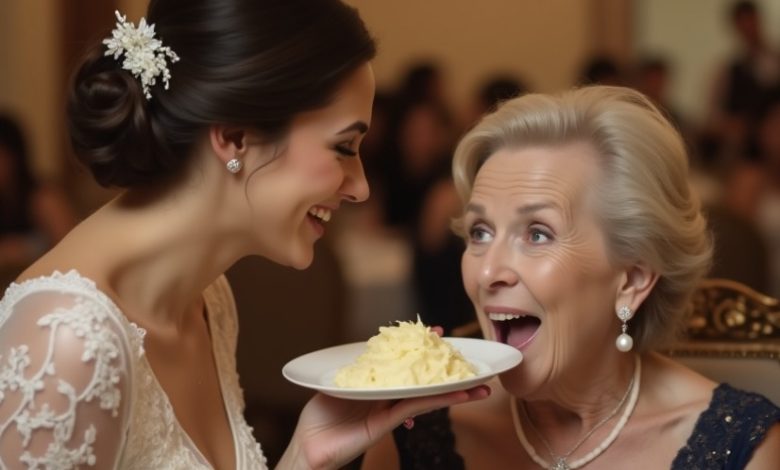
At my son’s wedding my new daughter-in-law shoved my face into the mashed potatoes and whispered, “Taste the food, old witch.” A man at the bar went white and let his drink sit untouched. “My God,” he shouted, his voice cutting through the stunned hush. “Do you know who that is? She’s a billionaire!”
That night something inside me broke, and something colder and sharper slid into its place. If I failed at what I was about to do, I would not only lose money. I could lose my son forever.
The ballroom looked like something bought with a very large card: crystal chandeliers, napkins folded like birds, a band playing old songs that made everyone blink at memory. I sat at table twelve, far from the head table, as if the distance might hide me. I was surrounded by people I barely knew. They offered thin smiles and small talk that kept moving away from the real thing, like they’d been told how to act around me.
I told myself it was okay. I did not need to sit in the center to watch my boy begin his life. But the lie tasted bitter. Evan looked so handsome in his tuxedo. For a moment, when Riley walked down the aisle, white silk flowing around her feet, something tiny in me hoped. Maybe she would bring him back to me. Maybe all the times I had been away, all the secrets I kept, would finally make sense.
Dinner was served: prime rib and limp green beans and mashed potatoes steaming under a gleam of butter. I barely tasted anything. I listened to his laugh from the head table and tried to memorize it. Riley’s laugh was brighter, sharper. She drew the room with her in a way that felt practiced. She knew how to own the space without asking for it.
Halfway through a champagne toast the air changed. I felt her before I saw her approach, felt the pressure in the room like a sudden drop in the weather.
“Mrs. Morgan,” she said, her voice loud enough to reach three tables. Her smile was a polished thing — pretty and hard. “We wanted to come and thank you.”
“You’re welcome, dear,” I said, holding my napkin.
“For everything you’ve done for Evan,” she went on, then the tone tilted a fraction and she leaned closer. “Especially for all those nights you were… otherwise engaged.”
The scraping of chairs stopped. Phones lifted; cameras found us. My skin tightened like a drum before a storm. “If you want to talk later—” I began, trying to keep my voice calm.
“No, now is perfect.” She got closer and the friendliness fell from her face like a mask. “He told me everything. The things you missed — the games, the school meetings, the nights he ate alone. You chose work over your child, and now you want to waltz in and play grandmother?”
Heat crept into my cheeks. I tried to stand but her hand shoved me back. Her nails dug into the fabric of my dress. In the other hand she held a plate. For a second it flashed white like a small weapon.
Then she hit me. Hot mashed potato, salted and peppered, slapped my face. Humiliation streaked pain in front of everything: the hot starch on my cheek, the sting, the wetness down my jaw. A gasp went up from the room. Someone dropped a fork. Someone shouted for napkins. The band stopped. The room smelled of butter and perfume and shock.
“Taste the family meal, old witch,” Riley hissed in my ear.
Silence closed in. Then a man at the bar laughed a little too loudly, shocked and cruel. “Do you people know who he is?” he asked, as if he were making a new and shocking discovery. “He asked for the suite. He named a number — billions.”
The word hung there, clear and heavy. Heads turned. Faces rearranged. Riley’s fingers loosened on the empty plate. I looked for Evan and could not find him. People lifted their phones and aimed them at me. I felt like an animal under lights.
I stood carefully. The starch rolled off my chin and landed on the tablecloth with a small wet slap. I walked across the room. Each step in my heels hit the marble like a small hammer. No one stopped me. No one said sorry. When I reached the doors I heard my son’s voice, a shout split with confusion.
“Mom? What… Is this true?”
I kept walking. I could not hold both his eyes and that impossible number in my head. One of them would crack.
At home the small bathroom smelled of cheap aloe soap and burning pride. I rinsed and rinsed at the sink until the water ran clear, watching the white bits swirl down the drain. In the mirror my cheek was an angry raw pink. I wanted to sleep for days, then wake up to a different life. Sleep was a luxury for those who could afford to waste the first hour of a fire. Tonight I could not waste anything. Tomorrow would be hard. Tonight had to be useful.
Three days passed the way pain does: loud and raw at first, then a dull, steady hum under everything. My phone lit up with messages I did not open. When Evan finally called his voice was colder, harder, different from the boy who once crawled into my lap and fell asleep to the sound of my heart.
“We need to talk,” he said. “Neutral ground. The café on Third. One hour.”
I got there early and sat in a booth in shadow. Rain smudged the city outside like watercolors. Evan came in, ordered black coffee, and finally looked at me.
“Are you rich?” he asked. The word was a hammer.
“Yes,” I said.
“How?” he asked, as if he needed the answer to prove something.
So I told him the small truths I could. After his father died we had bills that would not stop, men knocking at the door with teeth. I worked double shifts, cleaned offices at night, took odd jobs that no one would want to list on a résumé. I told him about a broker who looked at me like I could be turned into something and kept saying yes to better deals. I explained how one small property led to another. I spoke in plain sentences about buying cheap, fixing up, renting out, and then buying more. I kept my voice steady and made the story sound like a ledger rather than a confession.
I did not say everything. I did not tell him about threats from competitors, about envelopes left on cars, about having our mail sent to a box so no one could find us. I did not say how many nights I lay awake worrying I would lose it all. I did not tell him about a fund set to open on his fortieth birthday, a safety built quietly so he would not have to beg or cry. I gave him the small truth, and to him it must have sounded huge.
“So you let me grow up thinking we had nothing,” he said. The words cut. “I took scholarships you could have paid. I thought I had to fight for every scrap.”
“I wanted you to stand on your own,” I said. “I wanted you to be picked for who you are.”
“No,” he snapped. “You did it to protect yourself. From women like my wife. From anyone who might see you as a way in.”
Rain drummed on the windows. He looked at me the way grown sons look at mothers who are suddenly small and old. “She attacked you,” I said. “In front of everyone.”
“She was protecting me,” he insisted, loyalty sharp and painful. “From you.”
He stood up. “We’re done here,” he said, and left without touching his coffee. The chair scraped. I sat a long time with my tea gone cold and the rain like a sheet between me and the city.
I called Mark. He does not say “I told you so.” He just says, “Send me what you have,” and then he disappears into work. Mark used to be my head of security in a different life. Now he handled things that needed quiet hands.
Two days later a plain courier left an envelope on my table. Inside were photos and files: small pieces pulled from public records, screenshots, party photos with dates. It was the kind of patchwork that only a careful person could see and make sense of. Riley’s life showed a pattern. She stood on the arm of older men in glossy photos. Dates overlapped. Stories left blanks where explanations should be. No arrests, no lawsuits. Just a trail of expensive dinners and sudden quiet when questions came.
I called Mark. “She’s smart,” he said after one look. “She counts on shame more than on law. She knows how to use a room.”
“Keep looking,” I said. “Anything legal. Anything medical. If she tries to say I am the bad one, I want to be before that idea forms.”
He widened the search. He called old friends, checked public filings, followed names to companies with fancy addresses that led to boxes in small islands. He found a pattern of luxury spent and then withdrawn from sight. People who owned apartments and disappeared when questions came. Men who liked the same gala photos and then left town. It was not one smoking gun but a line of smoke leading to more smoke.
I sat with the papers spread like a cruel family album. For the first time I did not want to be the quiet hero. I decided I would be the monster if that was what it took to save my boy. I had been called worse. I had done worse. I picked up the phone.
“What is your limit?” I asked Mark.
He answered without surprise. “There’s a limit to what we can do in public. There’s always a way to make someone’s life messy without breaking the law yourself.”
“Make it messy,” I said. “Start with the men who turn up in those photos. Follow their money. Make the mess big enough someone notices.”
He did. He called people whose names were like keys: accountants, shell companies, a lawyer in a city that does not ask many questions. Each thread Mark pulled made something else show. People we thought were careful had not covered every door. Numbers leaked. Small checks became regular wires. A property here, a trust there. It was not the kind of crime that makes headlines with sirens and shouting at first. It was quiet, slow, and deadly — the kind of thing that, when you trace it back, shows not a single thief but a network.
I spent nights awake with the photos on my lap and a quiet plan in my head. If the worst happened I would stand and say what needed to be said in court. If I could not use what Mark found because it was messy, I would find another way. I would be the villain if villainy kept my son safe. I would let them call me names. I would take the heat.
Because there are things worse than being laughed at in a room full of strangers. There are things worse than shame. There is losing the child you raised to someone who wants him for what he can bring.
So I waited, and Mark worked, and I tried to keep my hands from shaking when my phone buzzed. The world had changed around me in three days. I did not know where it would end. But I knew one thing: I would not stand quietly while my son’s life was sold piece by piece. I had built a life out of small, stubborn choices. Now, faced with the choice that mattered most, I would use every small thing I had left.

